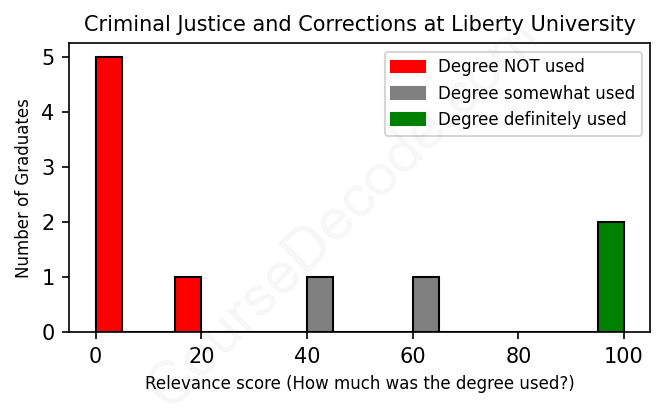
First, some facts. Of the Criminal Justice and Corrections graduates from Liberty University we've analyzed , here's how many have used (or NOT used) their degree in their career:

These are estimates based on AI analysis of 10 LinkedIn profiles (see below).
The verdict? Horrible! Overall, with an average relevance score of 31%, Criminal Justice and Corrections graduates from Liberty University have an exceptionally lower likelihood (-36%) of finding work in this field compared to the average graduate across all fields:
And for comparison, here's the chart for all profiles we've looked at across all degrees.
Also, after graduating, only 20% of these graduates have pursued further education other than another Bachelor's degree (such as a Masters degree or other), compared to the average across all profiles of 35%. This suggests a Bachelors degree is enough for most Criminal Justice and Corrections graduates, and it's normal to look for work straight after graduation.
See the details:
|
Relevance score: 100% We think this person has gone into a career highly relevant to their degree. We think this person has gone into a career highly relevant to their degree.
DEGREE INFOGraduated in 2022 from Liberty University with a Bachelor of Science - BS in Criminal Justice and Corrections. No other secondary education since. JOB HISTORY SINCE GRADUATIONArmy Officer US Army Sep 2022 - Present ABOUTNo information provided. |
The top 10 most common jobs done by the graduates we've analyzed (ranked most common to least) are:
From the analysis of LinkedIn profiles of graduates from Liberty University with a degree in Criminal Justice and Corrections, it looks like many of these individuals have ventured into fields that don’t align very closely with their education. Common job titles include real estate agents, construction helpers, and various retail positions, which primarily focus on sales, customer service, or manual labor. These roles mostly lack a direct connection to criminal justice and corrections, suggesting that many graduates have taken paths well outside their field of study.
On the flip side, there are some notable exceptions where graduates have secured positions like Probation Officer, Drug Treatment Specialist, and Army Officer, which are clearly relevant to their degree. These roles directly apply the principles and knowledge of criminal justice and corrections on a daily basis. It's a mixed bag overall — while a few graduates are making use of their degree in meaningful ways, many others are working in jobs that don't utilize the specialized skills they learned in school. This may reflect broader job market trends, where opportunities in the criminal justice field can be competitive and not all graduates find positions that directly align with their studies.
Here is a visual representation of the most common words in job titles for Criminal Justice and Corrections graduates (this is across all Criminal Justice and Corrections graduates we've analyzed, not just those who went to Liberty University):

From analyzing the career paths of Liberty University graduates with degrees in Criminal Justice and Corrections, it seems many of them have found roles in various fields that don't directly relate to their studies right after graduation. For instance, some graduates started off in construction, real estate, and positions like cashier or appliance specialist. This suggests that while they may have had ambitious career goals in criminal justice, some ended up taking jobs that might not feel very satisfying or relevant to their degree.
However, as time goes on, there's a noticeable shift for many of these graduates. After a few years, some managed to transition into more pertinent roles within the criminal justice system, like probation officers or drug treatment specialists. This indicates that while some may have started with jobs unrelated to criminal justice, they eventually pursued paths that align more closely with their field. So, in the long run, there are definitely cases of successful career progression, but the initial years can be a mixed bag, with graduates exploring paths that might not directly utilize their training in corrections or justice.
Getting a Bachelor’s degree in Criminal Justice and Corrections can hit a sweet spot between being challenging and manageable, and Liberty University’s program is no different. It’s definitely not a walk in the park, but if you’re passionate about the subject, you'll likely find it engaging. You’ll dive into topics like criminal law, policing, and corrections systems, which can get pretty deep, but the workload usually balances out with some good support from professors and resources. If you stay organized and keep up with readings and assignments, it can feel easier than some other majors that require more intense math or science. So, if you have a genuine interest in the field, you're probably going to be okay and even enjoy the journey!
Most commonly, in the LinkedIn profiles we've looked at, it takes people 4 years to finish a Bachelor degree in Criminal Justice and Corrections.
Looking at these graduates from Liberty University, it seems like they're not exactly rolling in dough, but they're also not struggling too much. The ones in real estate and self-employment like the business owner or residential builder might have more potential to make decent money if they hustle hard, especially in a good market. On the flip side, roles in security and as a cashier typically pay less, which might limit their earnings. The nursing assistant and appliance specialist likely make average salaries too. Overall, it seems like some are on a decent path, while others are working jobs that might not lead to big bucks anytime soon. So, it kinda varies, you know?
Here is a visual representation of the most common words seen in the "about" section of LinkedIn profiles who have a Bachelor degree in Criminal Justice and Corrections (this is across all Criminal Justice and Corrections graduates we've analyzed, not just those who went to Liberty University). This may or may not be useful:

Here are all colleges offering a Bachelor degree in Criminal Justice and Corrections (ordered by the average relevance score of their Criminal Justice and Corrections graduates, best to worst) where we have analyzed at least 10 of their graduates:
| College | Score | Count |
|---|---|---|
 American Military University American Military University
|
52 | 13 |
 Bridgewater State University Bridgewater State University
|
50 | 13 |
 University of Central Florida University of Central Florida
|
47 | 14 |
 University of North Texas University of North Texas
|
47 | 14 |
 University of Phoenix University of Phoenix
|
41 | 23 |
 University of Cincinnati University of Cincinnati
|
41 | 12 |
 Sam Houston State University Sam Houston State University
|
35 | 22 |
 John Jay College (CUNY) John Jay College (CUNY)
|
35 | 12 |
 Ferris State University Ferris State University
|
34 | 14 |
 Florida International University Florida International University
|
31 | 17 |
 Liberty University Liberty University
|
31 | 10 |
 California State University-Sacramento California State University-Sacramento
|
24 | 14 |
 Colorado Technical University Colorado Technical University
|
24 | 16 |